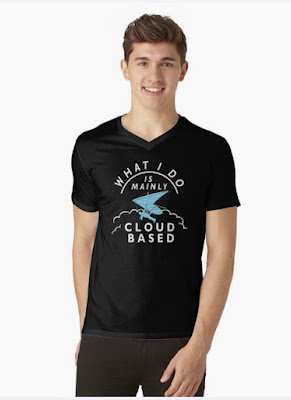AI meets Dunning-Kruger -- Susan Price
 |
| Enginesoptional, Redbubble, 'We Fall Only To Rise.' Long-sleeved t-shirt |
Earlier this month, my AE colleague Debbie Bennett posted an amusing (but saddening) blog
about the threat posed to writers by the many people, in Debbie's words, 'upload[ing] thousands of low content bits of tat a day'. Much of the tat clumsily ripped off from others. Ripped off from us.
As Amazon's bots and human staff check everything uploaded for copyright infringement and other crimes, the rise in low-content tat means that it takes longer for all books published through them to be approved: so the shameless intellectual theft of a few makes indie publishing harder for us all, even when our material is legit.
I was reminded of another threat to all us hard-working, and mostly under-paid, writers and artists: the much vaunted AI or Artificial Intelligence.
One of my brothers told me about a Polish fantasy artist named Greg Rutkowski who, it seems, is being persecuted and ripped off by AI. Because his art is popular, people who want his work but don't want to pay him for his time, experience and effort, instruct AI bots to produce 'something like Greg Rutkowski.' Off the bots go, crawl all over the internet, and 'scrape' his images before producing something that looks sort of like a Rutkowski.
"It's nowhere near as good," says my brother. "But it's free and it'd pass with a lot of people." (Follow the link in Rutkowski's name if you want to see his genuine work.)
In this article, you can read how Rutkowski at first thought that the rip-offs might work as free advertising. But then he discovered that he'd been ripped off at least 93,000 times.
In a month. 93,000 times in a month.
"What about in a year?" he asks. "I probably won’t be able to find my work out there because [the internet] will be flooded with AI art. That’s concerning.”
The brother who told me this has a side-hustle, where he creates and sells designs through Redbubble. [See above, the photo at the top of this blog, and below.] When a customer buys a design, it's printed, on-demand, on t-shirts, mugs, laptop sleeves, cards and several other things.
 |
| 'UrbanParadise' Briar rose pattern A-line dress |
My brother produced the above design, inspired by medieval manuscripts and it took hours of drawing and reworking. Other colours are available.
My brother is discovering that Redbubble and similar sites are suffering from the same kind of computerised theft. Why bother putting work into figuring out what people are interested in, and drawing, composing, painting an image, thinking up a witty slogan? That's hours of work, when instead, you could just order your AI bot to trawl the internet looking for, say, 'drone t-shirts' or 'para-gliding t-shirts.' Steal the work of others, force Redbubble and similar sites to check and double-check, thus increasing their overheads. The thief makes a few quick quid while ruining things for the honest artists who put in the hours of work because they love doing it.
 |
| enginesoptional Hang-gliding t-shirt |
This theft of intellectual property has already reached our sphere of self-publishing with, as Debbie describes, short stories and illustrations stolen from KDP books. We can expect the problem to get bigger.
I'm reminded of when I used to help at a class for Adult Literacy. All of the students were admirably determined to improve their reading and writing skills so they could help younger relatives or improve their own employment chances.
One day a young man of about twenty turned up at the class -- much younger than our usual students. He wanted to learn to read and write, he told our class tutor, because he had decided he was going to be a writer.
It had leaked out that I was a writer, god help me, so our tutor asked me to join her in talking to him. She told him that, on average, it takes an adult eight years to attain fluency in reading and writing.
That didn't go down well. Eight years? I think he felt eight minutes would be too much.
I asked him why he wanted to be a writer. Did he have a family story or personal experience he really wanted to tell? (Quite a few of our students did, though none that I recall had any ambitions for their writing beyond their family circle.)
No, he said. He wanted to make a lot of money and be rich. (This was around the time when the news was full of how much money was being made by Philip Pullman and J. K. Rowling.)
O-o-kay, I said. What kind of story did he plan on writing to achieve this fortune? Fantasy? Historical? Police procedural?
He didn't know what I meant. Further questioning revealed that he didn't have a favourite kind of story. Obviously, he didn't read for pleasure -- but did he prefer watching crime series on TV, or science fiction films?
No, he wasn't much bothered about watching films or TV either.
O-o-o-kay. So, did he have an idea for a story? -- No. But he wanted to write a book and get very rich.
Debbie's 'low-content' crowd reminded me sharply of him. I don't think I've ever, before or since, met in person such a perfect example of the Dunning-Kruger effect. Though, it's true, I don't get out much.
It's hardly necessary to say that our visitor had not the faintest, smallest idea of the amount of work, thought, planning and rewriting that goes into the creation of any novel. Or a short story. Or, for that matter, flash-fiction. It was as if I had decided that, over the weekend, in my backyard, I would build a sister ship for the Queen Elizabeth, without any knowledge of ship-building, no materials and no tools.
But hey, follow your dreams, eh? Where did I put that hammer?
That Would-Be, Get-Rich-Quick writer is, I think, exactly the kind of person who will seize on AI to steal other people's ideas and style. (Provided he could be bothered to learn how to use it.) Because he had no love of writing or story-telling. He had no conception of theme and plot and character, or why or how a writer uses them.
The only thought in his head was of all the piles of lovely money he was going to make. He didn't even know that he'd have as much chance of winning millions on the lottery.
While We're Here: What's Special About This Painting?
 |
| Lascaux, from Wikimedia |
It's special because it was painted between 17,000 and 20,000 years ago by people who had none of our technology but were anatomically identical to us. Their hearts sent blood around the same sort of bodies, making the pulses beat at wrist and throat and fingertips, just as it does in ours.
The cave paintings are evidence that, what they saw, they had to paint. They had to recreate it, take what was inside their heads and put it outside where it could be shared.
With enormous effort, they invented how to do it. There were no brushes or paints. They invented ways to make colour from charcoal and ground minerals. With patience and endless practice, they got the colour onto the walls by blow-spraying, dabbing and daubing. It was hard and required hours of time, practice and invention. But it was something they deeply cared about, that they needed to do.
Since the paintings are almost entirely of prey animals, it's thought they might have been a spell, to bring success in hunting, to feed themselves and their families. If so, these images were born of hunger, hope, desperation, love. Emotions that still pulse through our blood.
Think of the observation that went into making these images, the movement they've captured. Hours and hours of watching these herds, of walking alongside them, of observing -- and remembering and loving what's seen -- that the line of the back is just so, the curve of the neck, the shape of the antler, just so. And wanting to make others see it.
The practice involved in reproducing that line! In working out how to get that colour. In observing the patterns of colours on the animal's hides. Something in the blood beating in their heads and wrists and finger-tips compelled them to make these paintings.
Making these images mattered to these artists. Mattered more than anything else they might have done with that time. When others looked -- and look -- at them, they see what mattered so much to the artists. That's why they matter today.
A living writer might produced the most cliched, silly adventure story or the daftest rom-com. But they're willing to give up hours of their time to banging it out on their computer, or even scribbling it out on paper until their hand cramps -- because it matters to them.
It might not matter to us. We might not care to read it. But that's beside the point. It mattered to the artist or the writer, and the next thing they do will be better until, eventually, they produce something that many of us do want. We'll want it because this living, breathing person looked around them, observed our world, thought about it and channelled all that into their writing or their art, for us to share and to love, or hate. We may want to ignore the book, or ban it ot burn it -- or its author -- or rebuild the world in its image.
But what matters to the AI bot? Or its user?
Engines Optional link
Susan Price has won the Carnegie Medal and the Guardian Fiction Award.

Comments
For me (and, I suspect, most creatives) it's not the results that matter so much, but the whole messy human act of creation. Of course I'm happy if someone enjoys a book I've written, or admires one of my paintings. However, the creative journey is the whole reason for creating a work of art in the first place, rather like your cave pictures being representations of the spirit of the hunt. AI, with its rip-off culture and desire for instant gratification, will never understand that :-)